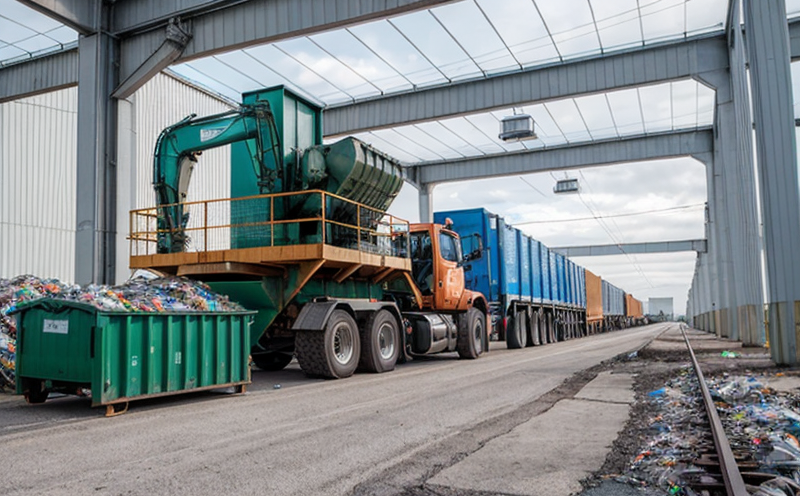ISO 20200 Compostable Plastic Recycling Testing
The ISO 20200 standard is pivotal in ensuring that compostable plastics meet stringent biodegradability and degradation criteria, making them suitable for circular economy processes. This testing ensures that materials can be effectively recycled into new products without compromising environmental integrity.
Compostable plastics are designed to break down under industrial composting conditions, which differ significantly from typical home or commercial composting environments. Understanding these differences is crucial in the design and development of such materials. ISO 20200 specifies a series of tests that evaluate the biodegradability, disintegration, and ecotoxicity of plastic materials.
The testing process involves several key stages:
- Sample Preparation: Specimens are prepared according to ISO standards to ensure accurate representation of material properties.
- Biodegradation Testing: Samples are exposed to industrial composting conditions, typically involving temperatures between 50°C and 60°C over a period of several months. This tests the ability of the plastic to degrade into carbon dioxide and water within this timeframe.
- Disintegration Testing: After exposure, samples undergo visual inspection and mechanical testing to determine if they have disintegrated sufficiently for recycling.
- Ecotoxicity Assessment: Any decomposition products are tested for potential harmful effects on soil organisms.
The results of these tests provide a comprehensive evaluation of the compostability of plastic materials, ensuring that they meet environmental standards and can be safely reintroduced into the recycling loop. This testing is essential for industries looking to transition towards more sustainable practices by incorporating biodegradable plastics in their processes.
Compliance with ISO 20200 not only benefits the environment but also enhances brand reputation and market competitiveness. It demonstrates a commitment to sustainability, which is increasingly important in today's consumer-driven world. For R&D engineers and quality managers, this testing ensures that new materials are viable and meet regulatory requirements.
Industries such as packaging, agriculture, and consumer goods can significantly benefit from the implementation of compostable plastics. By ensuring these materials comply with ISO 20200 standards, companies contribute to a more sustainable circular economy, reducing waste and minimizing environmental impact.
Why It Matters
The importance of ISO 20200 Compostable Plastic Recycling Testing cannot be overstated. As the world moves toward a more sustainable future, the need for materials that can be safely and effectively recycled is paramount. This testing ensures that compostable plastics meet strict standards, making them viable options for circular economy processes.
Customer Impact: Compliance with ISO 20200 enhances customer trust and satisfaction by demonstrating a commitment to environmental responsibility. It also opens up new market opportunities in sectors like packaging and agriculture, where biodegradable materials are in high demand.
- Better Environmental Stewardship: Ensures that plastic waste is managed responsibly through proper recycling.
- Increased Market Share: Companies compliant with ISO 20200 can differentiate themselves and attract environmentally conscious customers.
The testing process itself is a reflection of the broader principles of circular economy, which seeks to minimize waste and maximize resource efficiency. By adhering to these standards, industries contribute to a more sustainable future.
For R&D engineers, this testing provides valuable insights into material performance under real-world conditions, enabling them to innovate and improve product design. Compliance with ISO 20200 also ensures that new materials meet regulatory requirements, reducing the risk of costly non-compliance issues down the line.
Scope and Methodology
The scope of ISO 20200 Compostable Plastic Recycling Testing encompasses a range of parameters designed to evaluate the biodegradability, disintegration, and ecotoxicity of plastic materials. This testing is crucial for ensuring that compostable plastics meet stringent environmental standards.
Biodegradation: Samples are exposed to industrial composting conditions over several months. This process assesses whether the material breaks down into carbon dioxide and water under controlled temperature and humidity levels, typically between 50°C and 60°C.
Disintegration: After exposure, samples undergo visual inspection and mechanical testing to determine if they have disintegrated sufficiently for recycling. This step ensures that the material can be effectively processed in industrial composting facilities.
Ecotoxicity Assessment: Any decomposition products are tested for potential harmful effects on soil organisms. This assessment ensures that the materials do not release toxic substances into the environment during degradation.
The methodology involves a series of controlled experiments and analyses, ensuring accuracy and repeatability. The testing process is conducted in accordance with international standards such as ISO 17025, which guarantees the competence and quality of the laboratory performing these tests.





